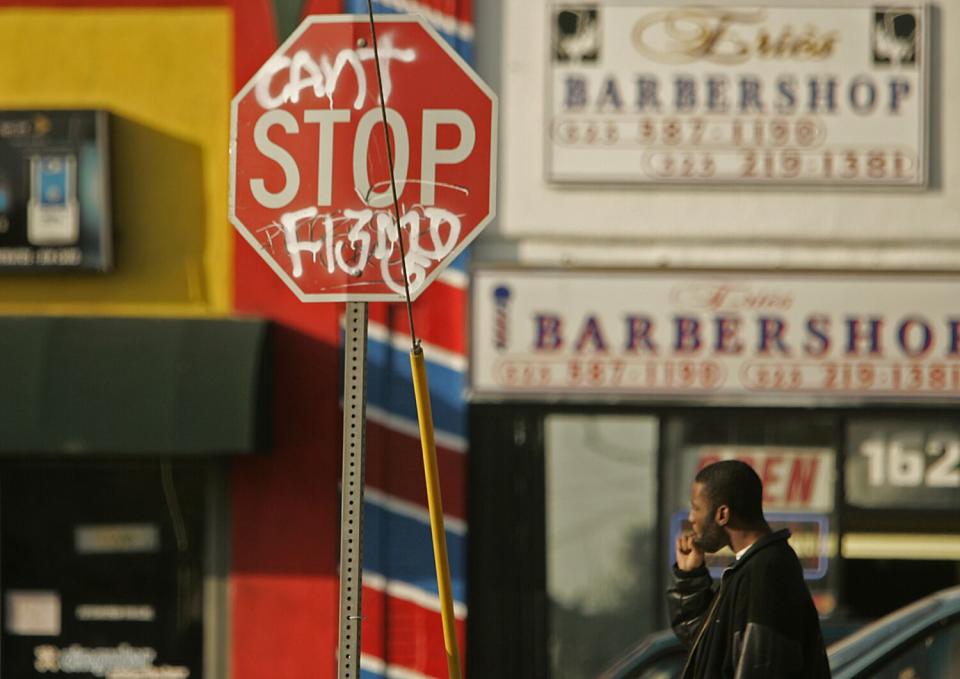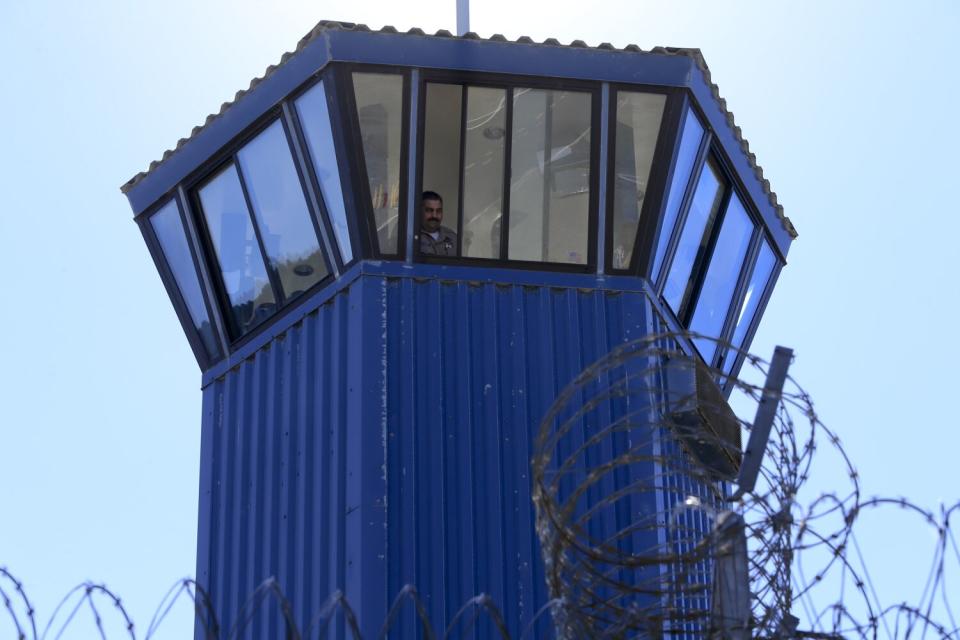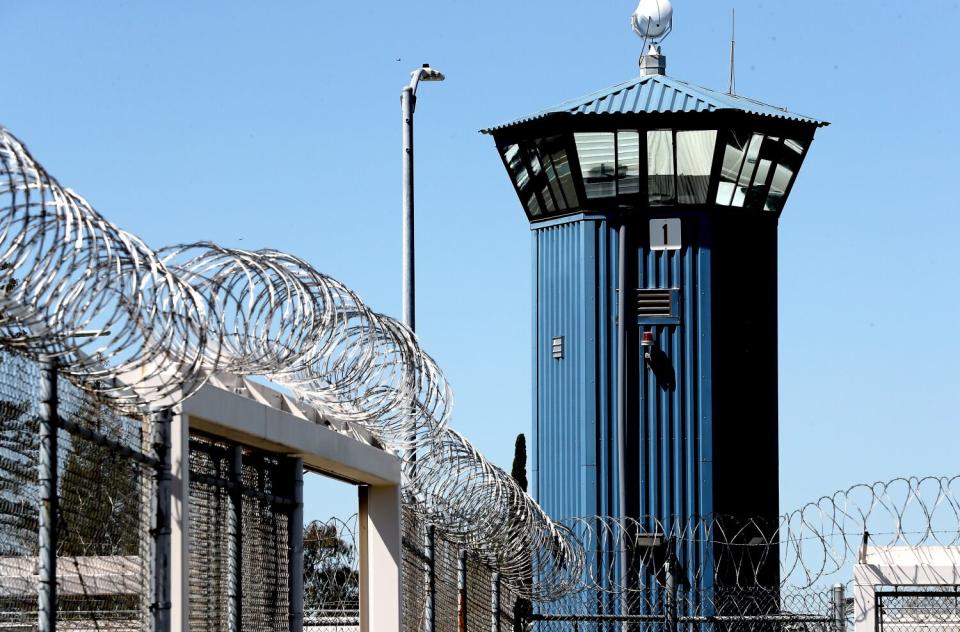A terminally ill prisoner didn't want his gang to die with him. So he wrote
From his prison cell, the older man with cancer in his stomach wrote down instructions to ensure his gang would not die with him.
"Choose four representatives. Two youngsters and two older. Youngsters: One of middle school age, one of high school age. And the other two older. They have to be respected by their homies.
"This way you cover all age groups and they know what the homeboys of that age are doing. I know when I was a youngster I knew … those that were active and those that were content just belonging."
Braulio Castellanos wrote those words in May, before a judge granted him compassionate release from prison — a rare legal action that freed him after serving 35 years for two murders. He died last week at 64.
Castellanos was only the eighth inmate granted compassionate release this year across a prison system that incarcerates about 95,000 people, said Mary Xjimenez, a spokeswoman for the state corrections department. Seventeen people were released last year, she said.
A Mexican Mafia member who controlled one of the largest gangs in Los Angeles, Florencia-13, Castellanos shaped generations of gang members on the streets of California and in prison yards up and down the state.
In his writings, seized from his cell before his release, Castellanos expounded on the current state of the Mexican Mafia, riven by infighting even as its influence spreads to new cities and new rackets, and put forward a vision for the future.
"As it stands," he wrote, "a handful of brothers have the larger percentage of the funds being generated throughout Southern Calif. We, as the majority, shouldn't allow this to continue."

Castellanos was born in Mexicali, Mexico, one of eight siblings, and was brought to Los Angeles by his parents when he was 6 months old, according to parole records. His nickname, "Babo," came from a younger brother's pronunciation of his first name, he told the parole board.
He graduated from Andrew Jackson High School in East L.A. in 1977, working after school as a liquor store clerk. He later held jobs as an auto mechanic and a factory press operator.
At 21, Castellanos was convicted of robbery and sentenced to six years in prison. He would later tell a probation officer those years “programmed me for violence."
"You have to be able to defend yourself in prison," he said.
A year after getting out, Castellanos and his girlfriend decided to celebrate New Year's Eve at the Lettuce Patch Lounge in San Bernardino. Mark Vasquez, 22, came up to their table and demanded to know where he was from, Castellanos recalled at a parole hearing. “I told them I was too old for that, you know. I was already 27 years old and I didn’t play gang-banging or none of like that.”
Every time Castellanos passed Vasquez and his friends on the way to the bar, “they yelled stuff at me," he said. "I tried to ignore them the best I can, but after a while they just got real nervy so when I passed by I yelled back, you know?”
A fight erupted. Castellanos recalled someone holding him in a headlock and being clubbed with a champagne bottle. “I do remember having a knife in my hand and stabbing,” he said.
When the owner of the bar, Tito Lechuga, tried to break up the melee, Castellanos slashed his throat. The 65-year-old was dead by the time police arrived. Vasquez, stabbed 12 times, died later that night.
"I was raised with a religious background, you know, and I had never killed no one," Castellanos told the board. "I had never hurt no one, in fact, before. And then to see this happen, you know, that felt like just something inside of me just died at that time, you know? Like the good in me just turned its back on me."
Convicted of two counts of second-degree murder, Castellanos was sentenced to 21 years to life. "I pray to God every night that you die," Vasquez's mother said at his sentencing.
It's unclear when he was inducted into the Mexican Mafia, a group of about 140 men drawn from the top ranks of Latino street gangs in Southern California, but at a parole hearing in 2000 Castellanos acknowledged he'd been classified by prison authorities as a member.

For 25 years, Castellanos lived under the most restrictive conditions the state prison system could offer: the Security Housing Unit, or SHU, at Pelican Bay. His younger brother Arturo, nicknamed "Tablas," was also at Pelican Bay, incarcerated since 1979 for murder.
They could not use a telephone. Their mail was scrutinized and their visits were monitored. Yet the Castellanos brothers still managed to control their old gang, Florencia, from 700 miles away, law enforcement officials testified at trials in L.A.
Quieter than his younger brother — who grabbed headlines for his role as a prisoners' rights spokesman and grabbed the attention of law enforcement for allegedly triggering a race war in the Florence-Firestone neighborood — Braulio Castellanos was arguably the true power behind Florencia, law enforcement officials and gang members say.
Describing him as "the silent partner," a federal agent testified at a racketeering trial that Braulio Castellanos' name was rarely mentioned on wiretaps, but "we knew he was there."
Prosecutors brought indictments against the gang that sent dozens of its members to prison for murder, drug dealing and extortion, although the Castellanos brothers themselves were never charged in federal court. Three Florencia members are set to stand trial next month on murder charges in the death of an off-duty Los Angeles Police Department officer, Fernando Arroyos, in a botched robbery.
In 2015, the Mexican Mafia underwent a seismic shift. Prompted by protests and a hunger strike led in part by Arturo Castellanos, the state corrections department transferred prisoners out of the Pelican Bay SHU and onto general population yards.
Held for decades in isolation, forced to relay orders through coded letters and hand gestures in the visiting room, Mexican Mafia members now had direct contact with their underlings and access to contraband cellphones.
In his writings, Braulio Castellanos said this set off a land grab. "Consider this: Some brothers got out of the SHU before others. It became first come, first served. By the time I got out everything was taken. Those that claimed huge territory didn't offer me a thing."
According to Castellanos, the Mexican Mafia has reached beyond the Southern California barrios where most of its members grew up. He acknowledged collecting money from gangs in Northern California, once considered the province of their most bitter rival, the Nuestra Familia. And an unnamed "brother" was "getting at barrios in other states and schooling them in the way we do things," he wrote.
"Once he's done, he's explained to me that they will be placed under brothers. All will be watched closely so it will be done in a fair way."

The Mexican Mafia has no hierarchy. Decisions are supposed to be made by consensus: One man, one vote. But Castellanos wrote that some members have formed coalitions to manipulate the results.
If they are outvoted on a conference call, which they dial into using cellphones, "they hold another conference a week later," he wrote, "and this time they leave the brothers out that voted against them."
After lining up the votes to put a member in "bad standing," meaning to strip him of his authority and sources of revenue, these voting blocs "decide what is going to happen and when," Castellanos wrote.
"They know who is holding the bro's assets and when it's done they go collect. The barrios, casitas, dispensaries, etc, that become available are first gone through by them."
A member in "bad standing" must be killed. Castellanos scoffed at the idea of telling someone to "step down."
"We all know there is only one way out," he wrote.
In the case of Danny "Popeye" Roman, a dominant figure in the Mexican Mafia who was stabbed to death in 2020, "a substantial amount of brothers voted against it," Castellanos wrote.
Hinting that Roman had been accused of being an informant, Castellanos said, "it was agreed on that he didn't do that intentionally," emphasizing in dark ink the last word, "and would remain in good standing."
Roman was killed nevertheless.
Castellanos advocated for a return to the old way of doing business, when a Mexican Mafia member laid claim only to the area where he was from. New territory, such as in Northern California, should be parceled out equally. "I have barrios up here and I'm willing to do my part," he wrote.
In early May, Michael A. Smith, the retired judge who had sentenced Castellanos in 1988, ruled in San Bernardino that Castellanos had "a serious and advanced illness with an end of life trajectory" and ordered his prison sentence "recalled in its entirety," a record of the hearing says.
On May 12, Castellanos, who had a wife waiting for him in Crescent City, two children and six grandchildren, left Solano state prison a free if dying man.
This story originally appeared in Los Angeles Times.

